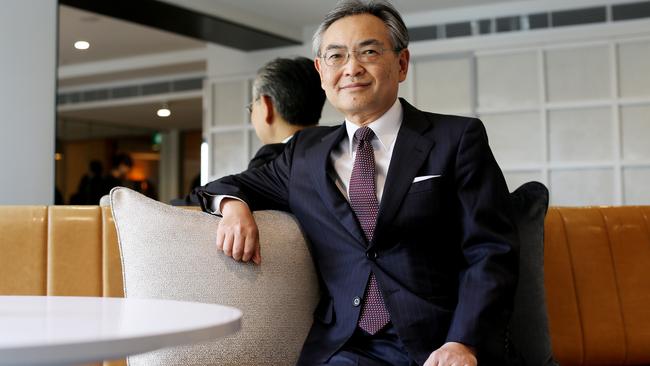Japan’s quiet approach to Colonial First State
Japan’s Mitsubishi UFJ Financial Group plans a hands-off approach at Commonwealth Bank’s asset management arm.

Japan’s Mitsubishi UFJ Financial Group plans to set up a local board when it closes the $4.1 billion acquisition of Commonwealth Bank’s asset management arm, even as it takes a largely hands-off approach to managing the division.
MUFG, which has a market capitalisation of about $95bn and is nearing deal completion, plans to run Colonial First State Global Asset Management as a standalone unit with “autonomy” in key functions.
“Asset management is purely a human business and it is quite a tough business, although the market itself is growing as wealth is accumulated around the world,” chief financial officer Aki Tokunari told The Australian during a visit to Sydney, saying job cuts were not planned. “We at MUFG have no intention to centralise everything, we rather prefer they appreciate their own culture.”
The parent will provide support functions such as technology systems and compliance.
MUFG agreed to buy CFSGAM in October last year to tap into future growth rates in Australia’s $2.8 trillion superannuation system and increase its exposure to emerging markets and asset classes, including infrastructure.
At the time, CFSGAM had $213bn worth of assets under management across Australia, Europe, the Middle East and Africa and Asia. CBA’s interim results showed that figure fell to $211bn as at December 31, given the late 2018 market rout, and first-half revenue at the division fell to $433 million.
But Mr Tokunari said he was upbeat on the purchase, particularly after CFSGAM recently won new mandates.
“We at MUFG are confident that they will be able to maintain investor support thanks to their robust track record and long-standing investment capabilities, even during more challenging periods,” he said.
The CFSGAM transaction was expected to close mid-year, subject to regulatory approvals in markets spanning Australia, Japan, Hong Kong, Singapore, the UK and the US.
“I am optimistic about getting approval. Sooner rather than later, we will be able to close the deal,” Mr Tokunari said. “We do not anticipate any issues with approval for the transaction.”
He highlighted that 13 CFSGAM senior executives, including boss Mark Steinberg, travelled to Japan last month to meet with MUFG’s leaders as the deal inched closer to completion.
MUFG wants to set up a local board and plans to dispatch a full-time and two part-time directors to Sydney. It may also send personnel to major functions and locations to support CFSGAM’s business.
Mr Tokunari said he expected CFSGAM would seek to capitalise on opportunities in the US infrastructure sector and may push further into emerging markets.
While its global footprint is constantly increasing, including via acquisitions, MUFG does not have any near-term plans for further purchases in Australia.
“We don’t have any specific pipeline at this point in time,” Mr Tokunari said.
CBA’s divestment of CFSGAM is part of a broad retreat by CEO Matt Comyn back to its core operations. However, Japanese companies seeking growth abroad have, been on a global acquisition spree, including in Australia, in the past four years.
This year, Nippon Paint lobbed a $3.8bn offer for ASX-listed DuluxGroup, following the CFSGAM transaction, while Dai-ichi Life snapped up Suncorp’s life insurance business. Japan Post took over Toll Holdings in 2015, the same year as Nippon Life’s purchase of a controlling stake in MLC life.
MUFG has outlined a target to become a top 15 asset manager globally. Its fiscal 2018 results presentation, handed down in May, showed that after the CFSGAM purchase completed the group would be the biggest asset manager in Asia and Oceania with assets under management of $US828.5bn ($1.18 trillion).
But the global push for MUFG has not all been smooth sailing. In February, a US banking regulator ordered several of the group’s branches to strengthen anti-money-laundering controls after finding shortcomings.
The company does have a long track record in Australia. That includes a strategic alliance with AMP and holding a 15 per cent of AMP Capital since 2012, a partnership Mr Tokunari recommitted to while in Sydney despite the wealth group’s broader turmoil following the Hayne royal commission.
“We are very happy with the longstanding relationship with AMP and our strategic alliance with AMP Capital is the crucial part of the overall asset management strategy,” he said. “So we intend to maintain the strategic relationship going forward.”
Mr Tokunari lauded Australia’s superannuation system (the third-largest pension pool in the world), which he said Japan envied given its demographic characteristics.
“Australian superannuation is our teacher,” he said. “Australian society successfully developed asset management as a business and as an industry. We in Japan have five times bigger a population but our assets under management are less than Australia.”
The Japanese company is also one of the largest foreign lenders in Australia and now has a loan portfolio of about $25bn in this market.
“We have increased our loan balance by 20 per cent in the past three years … we expect this to grow further, accompanying growth in the Australian economy,” Mr Tokunari said.
MUFG also has a strong presence in the Australian project finance sector.
Mr Tokunari — who joined the group in 1982 — helped steer MUFG’s strategic investment in Morgan Stanley during the heights of the global financial crisis. He took the reins as CFO in 2015.




To join the conversation, please log in. Don't have an account? Register
Join the conversation, you are commenting as Logout